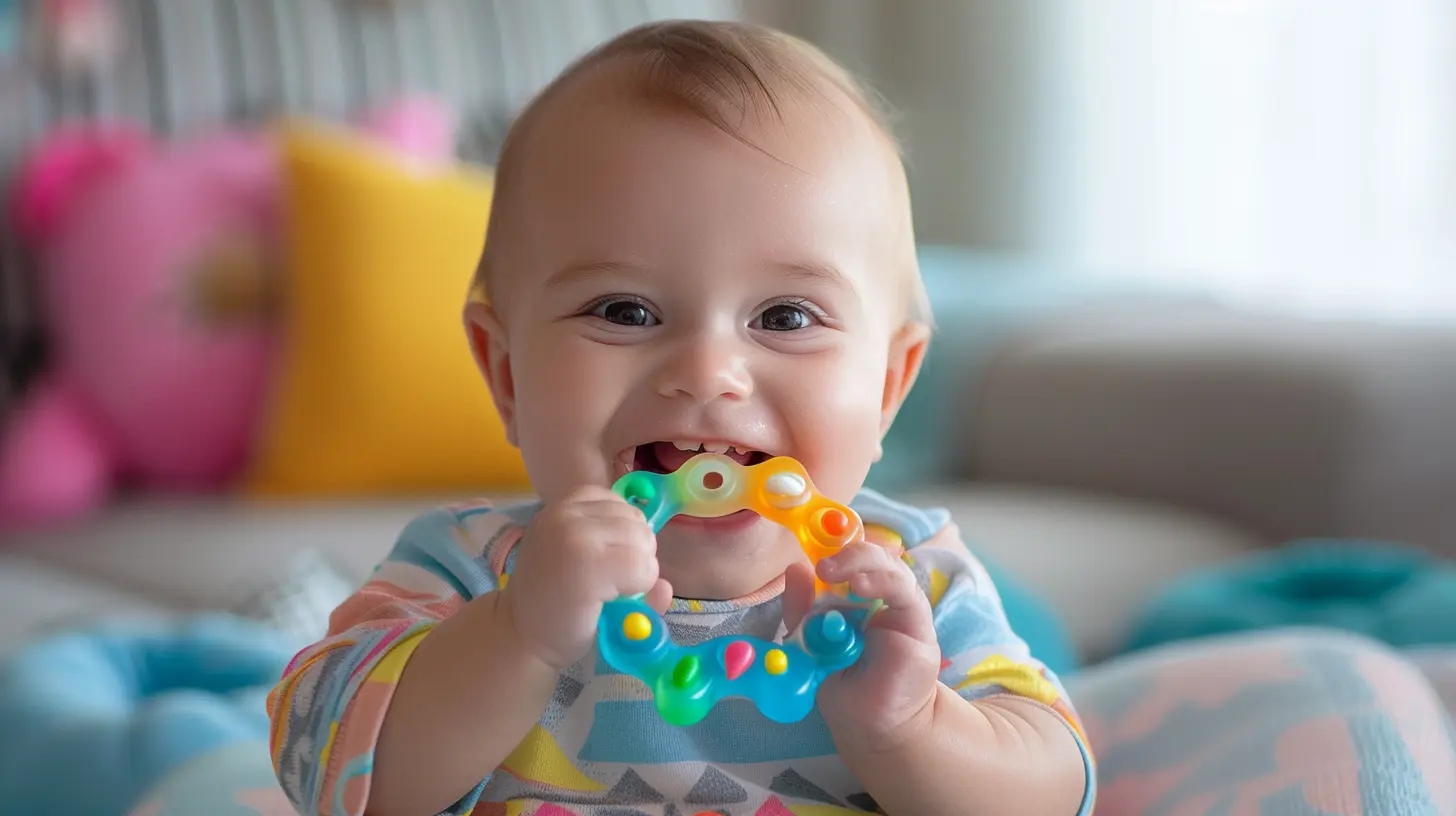The Link Between Teething and Biting Behavior
17 March 2025
Teething is one of those milestones that every baby goes through, but let’s be honest—it's not always a walk in the park. If your little one has suddenly become a nibbling machine, biting anything (and anyone) within reach, you're probably wondering: Is teething the reason behind this chomping behavior?
The short answer? Yes, teething and biting go hand in hand! But why do babies bite when they’re teething, and how can you help them through this phase without turning into their personal chew toy? Let's dive deep into this stage of development, uncover the reasons behind biting behavior, and share some helpful tips to soothe your baby (and save your fingers!). 
Why Do Babies Bite When Teething?
Babies aren’t biting just to be mischievous. There’s actually a logical (and developmental) reason behind this behavior.1. Relieving Discomfort
Imagine having a constant ache in your gums with no way to scratch that itch. Sounds frustrating, right? That’s exactly how teething feels for babies! Their gums are sore, swollen, and in search of relief. Biting down on something—even if it’s your hand—provides counterpressure that temporarily soothes the discomfort.2. Curiosity and Exploration
Babies use their mouths to explore the world. Everything they touch eventually ends up in their mouths because that’s how they learn about different textures, temperatures, and tastes. When teething kicks in, this natural instinct intensifies, leading to more biting behavior.3. Attention-Seeking Behavior
If biting gets a strong reaction from you—like a surprised squeal or a laugh—your baby might do it again just to see what happens. They’re not trying to hurt you; they’re simply experimenting with cause and effect.4. Frustration and Stress Relief
Teething can make babies cranky! Sometimes, biting isn’t just about soothing sore gums—it’s also a way for them to express frustration, soothe themselves, or release tension when they’re overstimulated.
When Does Biting Behavior Start?
Biting habits typically begin around the same time teething symptoms appear, usually between 4 to 7 months. However, some babies start teething earlier or later than this range.The first teeth to erupt are usually the bottom front teeth (lower central incisors), followed by the top front teeth (upper central incisors). As more teeth come in, you might notice the biting behavior becoming more consistent—especially during the first year. 
Signs That Your Baby is Teething
If you're wondering whether your baby's biting is related to teething, look for these common signs:- Excessive drooling (hello, soaked bibs!)
- Swollen or red gums
- Increased fussiness or irritability
- Frequent chewing on hands, toys, or anything they can grab
- Difficulty sleeping
- Loss of appetite (especially if sucking on a bottle hurts their gums)
If your baby is displaying these signs along with frequent biting, teething is likely the culprit. 
How to Reduce Biting Behavior While Teething
While biting is a natural part of teething, it can sometimes be painful—especially if your baby turns their tiny teeth on you! Here’s how you can help:1. Offer a Teething Toy
Teething toys are a lifesaver. They’re designed to provide relief by giving babies a safe and soothing object to chew on. Look for BPA-free silicone teething rings or chilled (not frozen) teething toys to help numb those sore gums.2. Use a Cold Washcloth
A simple hack? Dampen a clean washcloth, place it in the refrigerator for a few minutes, and hand it to your baby. The cool fabric will help soothe their gums while satisfying their urge to bite.3. Try Teething Biscuits or Chilled Fruits
If your baby has started solids, offering teething biscuits, chilled cucumber slices, or a frozen mesh feeder with fruit can provide relief while giving them a tasty distraction.4. Massage Their Gums
Using a clean finger, gently rub your baby’s gums in circular motions. This not only provides relief but also helps reduce inflammation.5. Redirect Them
If your baby is biting you, firmly but gently say "No biting" and redirect their attention to a teething toy. Offering a suitable alternative helps reinforce that biting on objects is okay, but biting people is not.6. Provide Extra Comfort and Cuddles
Teething can be rough, and sometimes all your baby needs is extra snuggles. Offering comfort through rocking, singing, or skin-to-skin contact can help ease their irritability.What If My Baby Bites While Breastfeeding?
Breastfeeding moms know the pain of a sudden bite during a nursing session (ouch!). If your baby bites while feeding, here’s what you can do:- End the session temporarily – If biting happens, calmly remove your baby from the breast. This helps them understand that biting means feeding stops.
- Use a firm but gentle response – Say "No, that hurts" in a calm voice, so your baby associates biting with discomfort.
- Offer a teething toy before nursing – Letting your baby chew on a teething toy for a few minutes before feeding may reduce the likelihood of biting.
Remember, biting during breastfeeding is usually a short phase. With patience and consistency, your baby will learn to nurse without nipping!
When Should You Be Concerned About Biting?
Occasional biting is normal, but if your baby habitually bites others—especially in frustration or anger—it might be time to step in. Here’s what to watch for:- Biting out of aggression rather than teething relief
- Biting frequently during playdates or interactions with others
- Getting frustrated easily when told not to bite
In these cases, gently but firmly reinforcing "no biting" and offering positive reinforcement for good behavior can help curb the habit.
Final Thoughts
Teething and biting go hand in hand, but the good news is—it’s just a phase! Your little one isn't biting to be mean; they’re simply trying to soothe their sore gums and navigate this new sensation. By offering the right tools, providing comfort, and teaching gentle boundaries, you can support your baby through teething without turning into their personal chew toy.So, hang in there! Before you know it, those tiny chompers will be fully in, and this biting phase will be a thing of the past. Until then, keep those teething toys handy and embrace the journey—drool, bites, and all!
all images in this post were generated using AI tools
Category:
Teething BabyAuthor:

Kelly Snow
Discussion
rate this article
10 comments
Nym McKay
Great insights! Understanding teething can really help manage biting behavior effectively. Thanks!
April 5, 2025 at 3:39 AM

Kelly Snow
Thank you! I'm glad you found the insights helpful. Understanding teething is indeed key to addressing biting behavior.
Hazel Black
As a parent, I've encountered the challenges of teething firsthand. Understanding the connection to biting behavior has helped me respond more compassionately. It's a reminder that our little ones communicate through their discomfort.
April 1, 2025 at 3:00 PM

Kelly Snow
Thank you for sharing your insights! It's true that recognizing the link between teething and biting can foster more compassionate parenting during this challenging time.
Zander Mullen
As a parent, I've experienced the challenges of teething firsthand. Understanding the connection between teething and biting has helped me respond with patience and empathy, fostering better communication with my little one during this tough phase.
April 1, 2025 at 4:27 AM

Kelly Snow
Thank you for sharing your experience! It's great to hear how understanding this link has helped you navigate teething challenges with patience and empathy.
Juliet McTavish
Biting during teething is a common behavior in infants. Understanding this can help parents manage and respond effectively to their child's discomfort.
March 29, 2025 at 3:46 AM

Kelly Snow
Thank you for your insight! Understanding the connection between teething and biting can indeed empower parents to respond compassionately to their child's discomfort.
Jessica Murphy
Thank you for sharing this insightful article! Understanding the connection between teething and biting has truly helped me empathize with my little one’s behavior. Grateful for your guidance!
March 28, 2025 at 4:06 PM

Kelly Snow
Thank you for your kind words! I'm glad you found the article helpful in understanding your little one.
Heidi Collins
Teething: the only time your little angel transforms into a tiny, toothy piranha! Remember, it’s not personal; they're just trying to chew their feelings!
March 22, 2025 at 4:03 PM

Kelly Snow
Absolutely! Teething can definitely bring out the piranha in little ones as they navigate their discomfort. It's a natural phase, and understanding their behavior can help us respond with patience and care.
Daniella Stone
Ah, the teething tango! It's like a tiny dental disco party in their gums, complete with unexpected bites! Imagine your baby as a miniature piranha in a stuffed animal sea. Who knew growing teeth could unleash such chompy chaos? Let's embrace the drool and nibble our way through this phase!
March 21, 2025 at 4:59 PM

Kelly Snow
Absolutely! Teething can indeed turn our little ones into playful nibblers. Embracing this phase with humor makes the experience a bit easier for everyone involved!
Mandy Sullivan
As a mom of a little one currently on the teething adventure, I can totally relate! Those tiny teeth seem to bring out the wild side in my baby, and I’ve learned that it's all just part of the journey. Thanks for sharing these insights and tips; they’re super helpful!
March 20, 2025 at 5:32 AM

Kelly Snow
Thank you for sharing your experience! Teething can definitely be a wild ride for both babies and parents. I'm glad you found the tips helpful!
Fatima Velez
Understanding teething helps mitigate biting; empathy is key.
March 19, 2025 at 5:05 AM

Kelly Snow
Thank you for your insightful comment! Empathy truly plays a crucial role in addressing biting during teething.
Oren Schultz
This article thoughtfully highlights the connection between teething and biting, often overlooked by parents. Understanding this behavior as a natural response can foster empathy and patience. Encouraging alternative coping strategies, like teething toys, is essential for guiding toddlers through this challenging phase while minimizing negative interactions.
March 17, 2025 at 3:29 AM

Kelly Snow
Thank you for your thoughtful insights! I appreciate your emphasis on empathy and the importance of alternative coping strategies for parents navigating this stage.
MORE POSTS

How to Spot the Early Signs of Tiredness in Your Baby

Virtual Playdates: Technology and Resources to Help Kids Socialize

Simple Strategies to Handle Toddler Tantrums Gracefully

Co-Sleeping: The Pros, Cons, and Safety Tips

How Establishing Routines Can Help Siblings Get Along

Talking to Your Kids About Mental Health Without Stigma

Managing Difficult Transitions with Routine Anchors